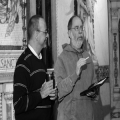You have no items in your cart. Want to get some nice things?
Go shoppingThe neighborhood had changed. The city got more expensive, more stainless and sleek. In response, people went back to the land: canning and pickling vegetables for winter. Foraging when the need had long gone. Bow-hunting deer and wild turkey in parks, draining the blood in wading pools. Reclaiming hard identities and calloused fingers they had tried so hard to soften or forget.

The old ways were coming back, too. Old tastes. Religion. Cigarettes. Casual racism, masturbation and chastity belts, and long, long fireside stories told on frigid winter nights. It was all back, and it was all in.
But no taste was more celebrated, held with more esteem, than the return of hunger artistry. And no man was more celebrated for his work than Dunphy.
In his off-season — his thinking time — Dunphy had to walk over homeless people sleeping on the sidewalk. Major bus intersections had attracted beggars. Sitting on cardboard boxes, plastic crates, and unfurled newspapers; deranged and disoriented, they demanded spare change. They seemed oblivious to being pitied or ignored. They seemed content to starve to death.
“Li’l hep,” one bloated, bleary man bleated, palm out.
Despite himself, despite his best instincts, Dunphy nearly laughed.
Amateurs, he thought. Really, seriously pitiful.
It had been three months since his last hunger binge, since disaster and downfall. It was enough time for Dunphy to walk, to think, to acquire a new pelt that would see him through the next hunger season, when he would cage himself, sleep on straw, and grow wan and hollow-cheeked.
Such successful performance art was rare, and Dunphy was the acknowledged master. Oft-photographed, hailed by Ducky Tours and other such brainless urban entertainers, he was frequently asked to sign autographs. Always gracious — unlike some of the competition, who were downright nasty — Dunphy inevitably complied. Today or tomorrow, he thought, money in the bank.
Forty days was once the limit before people lost interest — about the threshold of most tortured populations and troubled protestors. After a few artists had died of hepatitis and heart attacks, Dunphy was the first to reach sixty days. Exhausted and emaciated, he made a full recovery — and, for a handsome sum, he repeated his famed Sixty-Day Show for artists-in-residency and private saturnalias. Ever the best, he feigned losing his composure, pulling at his hair, digging through the straw, gnawing the bars of his cage.
Then there had been a challenge. Samantha, The Fasting Girl, an indigo-black West African who had known famine, was his main competition. Dunphy was judged impossibly old-school — the cage, the straw, the tired, predictable histrionics. For her part, Samantha used a Victorian fainting chair in a hip plexiglass cube, video cameras displaying her binge as she matched Dunphy day by gut-wrenching day.
The half-wit newsies played it as the Hate Match to the Death. Off-stage, though, the two were unlikely friends, occasional lovers. In the off-season, they enjoyed seafood feasts and western movies, laughing at men in skinny jeans trying to take down 200-pound boars with bows and arrows.
In season, Dunphy and Samantha pushed each other. Sixty. Sixty-one. Sixty-two, stopping short of the magical seventy-three, the golden line set by the legendary Riannini of the Rialto.
But one day Samantha clutched her throat and fell to her chair, dead of toxemia. Dunphy stared at her, then walked out of the cage.
The crowd, for which blood-letting and leeches were making a comeback, wouldn’t accept a live death. Tempers flared. We paid good money.
Three months later, Dunphy opened Seventy-Three: The Bataan Death March to reclaim his title. His very name.
No one came to see him that first day, but he knew they would. At first, curious glances from old fans; they didn’t want to look, but they did. The accented lines of the ribcage, yellowing skin, graying gums. They were hooked, to Dunphy and his march.
When Dunphy hit thirty the crowds came, so fast that stadium seating was wheeled in. Popcorn stands, organic food trucks, androgynous couples in their titanium belts cupping fistfuls of fried quinoa, snickering oh the humanity.
Then the Roaring Forties, Furious Fifties, Shrieking Sixties — the hard, muted lull before glory. The tortured steps towards true transcendence.
Then the Sublime Seventies, when all is hallucination, and the failure of heart and lungs builds like bellowing timpani, like rumbling cumulonimbus on the prairie. The crowds shuddered. Dunphy, barely able to lift himself, was but fifty pounds.
Then, yes, transcendence. It is coming.
So is Samantha.

Abby Mendelson and Vincent Rendoni
Abby Mendelson, Ph.D., is an Instructor in the Chatham University MFA program. An award-winning author of numerous works of fiction and non-fiction, he has published book-length studies of his adopted city of Pittsburgh, and two collections of short stories and three novels, his most recent being The Oakland Quartet. Seattle resident Vincent Rendoni has an MFA in Fiction from Chatham University. He released his chapbook, In the Methow Valley, in 2011, and has previously published fiction in The Rind, Shady Side Review, and FictionBrigade. Flash fiction writing partners since 2012, their stories have appeared in Fiction Southeast, Lime Hawk, Burrow Press Review and Atticus Review.




